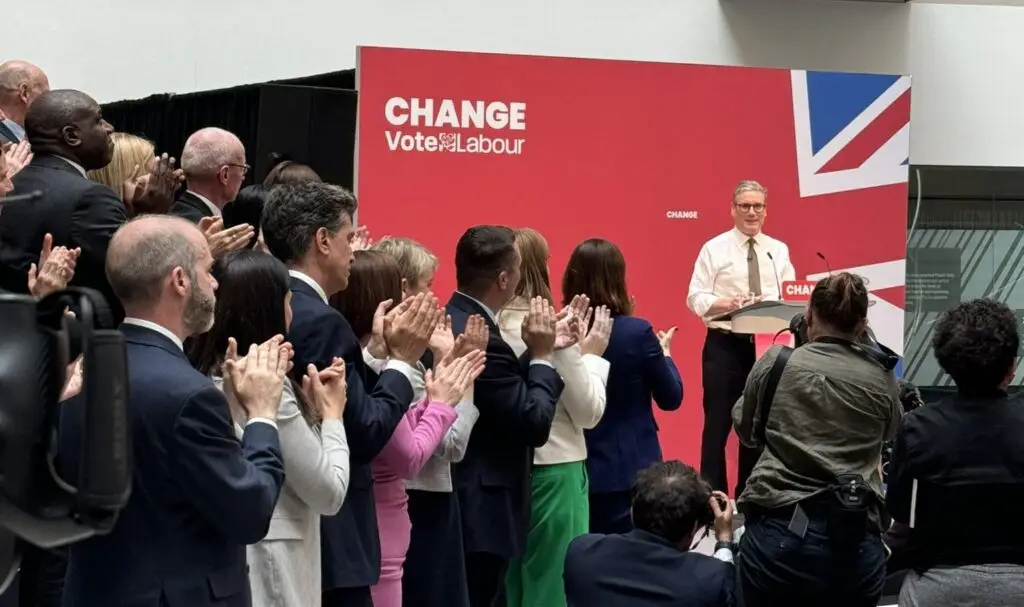With the General Election just around the corner, Labour has introduced a new manifesto with a dynamic industrial strategy at its core.
- Keir Starmer emphasises a proactive government working collaboratively with businesses, unions, and local leaders.
- Labour aims to prioritise key sectors including financial services, automotive, life sciences, and creative industries.
- Significant investment plans include a £7.3 billion National Wealth Fund focusing on clean energy and infrastructure projects.
- Labour also pledges major reforms in planning and housebuilding, promising the largest increase in social and affordable housing in generations.
In a landmark event at the Co-operative Building in Manchester, Labour unveiled its General Election manifesto, highlighting a bold industrial strategy aimed at fostering economic growth. With the election imminent, Keir Starmer positioned Labour as a more interventionist alternative to the Conservatives, championing a ‘dynamic and strategic state’ that collaborates closely with businesses, trade unions, and local leaders. Starmer stated: “This does not mean ever-growing government, but it does mean a more active, smarter government.”
Following an opening statement by Deputy Leader Angela Rayner, Richard Walker, CEO of Iceland and former Conservative supporter, declared his backing for Labour. Walker proclaimed: “As a business leader, I am sick and tired of chaos under the Conservatives. I am absolutely convinced that Keir Starmer is the leader to deliver the change this country needs.”
Labour’s strategy will be guided by an Industrial Strategy Council, representing all regions and trade unions. The party aims to support key sectors such as financial services, automotive, life sciences, and creative industries. A significant £7.3 billion National Wealth Fund is earmarked for various projects, including £1.8 billion to upgrade ports, £1.5 billion for gigafactories, £2.5 billion for the steel industry, £1 billion for carbon capture, and £500 million for green hydrogen manufacturing.
Moreover, Labour commits to closing a tax loophole on carried interest for private equity funds. Michael Moore from BVCA expressed disappointment but acknowledged the importance of maintaining the UK’s competitive edge. He noted: “Labour have set out their taxation position. And we have shown the party how much venture capital and private equity contributes to the UK, backing 2.2 million jobs across the economy.”
The housing and finance sectors responded positively to Labour’s proposed overhaul of planning laws and a massive housebuilding programme. The plan includes restoring mandatory housing targets and requiring councils to keep Local Plans current. Simon Peacock of JLL praised Labour’s commitment to regional growth and infrastructure investment. Meanwhile, Ryan Etchells of Together highlighted the need for support to SME house builders to fulfil these ambitions.
Labour’s housing strategy includes a ‘brownfield first’ approach, releasing lower quality ‘grey belt’ land, and mandating all Combined and Mayoral Authorities to plan for housing growth. Paul Dolan, CEO of Riverside, expressed cautious optimism about these plans, stressing the need for specific targets for social and affordable homes.
On education, Labour promises new Technical Excellence Colleges, partnering with businesses, trade unions, and local governments to provide better job opportunities and highly trained workforces. The manifesto also offers to reform the current Apprenticeships Levy, which Labour views as ‘broken’ under the Conservatives.
Labour’s ambitious manifesto outlines a forward-thinking approach to economic and social issues, seeking to drive growth through collaboration and strategic investments.


